We're Thinking About Now: An interview with Norm Brannon of Texas Is The Reason
To say that Texas Is The Reason were influential is an incredible disservice; frankly, the deafening response to their reunion and subsequent discography reissue (on Revelation in February) says the band ARE influential. Coming from some of the most popular, if not polarizing, hardcore bands of the early ’90s (Shelter, 108, Ressurection), Texas Is The Reason formed in 1994 and helped to shape a completely new punk music aesthetic. This aesthetic can be heard in nearly every next generation emo band the ‘00s have to offer; from Paramore to Thursday, and Transit to Taking Back Sunday TITRs influence exists in their roots. SPIN, Alternative Press, and Paste would all go on to call Do You Know Who You Are?, their 1996 debut and only full-length, an essential ’90s album. They got that shit right!
Unfortunately, after a year of heavy promotion and touring for the record, inner-band tension came to a head and the band officially split in 1997. Its members would go on to form Jets To Brazil, New End Original and Solea. But diehards always held out hope that the members would circle back and in 2013 that hope came to a head.
As a product of ‘90s emo and hardcore, it was my great personal pleasure to discuss the reunion with Texas Is The Reason guitarist Norm Brannon (formerly Norm Arenas). This is what he divulged about the band’s history, catalog, and comeback….
What catalysts were at play that caused the band to abandon the major label bidding war and call it quits all those years ago?
The biggest one, by far, was the fact that our relationships with each other were just falling apart. Like, I remember reading an interview with Scott [Winegard] where he said, “We broke up because I hated my three best friends,” and I think that’s on point. I think that, in general, we were all in the middle of a volatile part of life — that part in your early twenties, where you’re just figuring out how to be a grownup, but you’re still kind of a kid — and then we were thrust into a really volatile situation. The bidding war really complicated things, the attention complicated things, the sudden feeling like this thing we made could be more than we ever thought it would be… I just think we were too immature to deal with it in any sort of sustained way. We felt the pressure and we crumbled.
But in the end, you know, I don’t think we’ve ever really regretted that. That flash of time was intense and incredible and it reflected in the music. What little we put out in the world couldn’t have been less convoluted or more honest. I think people could sense that, and I think that’s why it still feels relevant — even to us. When we play these songs now, they’re still in the present. We’re not thinking about 1996; we’re thinking about now. That really says something.
Have you ever been envious that peers like Jimmy Eat World continued and made a career from their mid-90s emo roots?
Not at all! I mean, like, we’re friends with Jimmy Eat World, and we know they went through a lot to get where they are. It was like the opposite of what happened to us on some level — they weren’t an instant thing at all. They built it. I can’t help but feel in awe of what they do on that level, to be honest, but not envy.
What is it about Texas Is The Reason’s output that still resonates all these years later?
There’s probably two answers to that. Like, on a practical level, we’re lucky enough to have been on a record label that kept our records in print after all these years. So many great bands that we played with — Samuel or Boys Life or Kerosene 454 — I don’t know if you can get those records anymore. There’s also the fact that we were lucky enough to make really great sounding records for the most part; they don’t sound dated or tied to the ’90s in some way.
But on a more speculative level, I think there’s always been that something I can’t put my finger on that made this experience different. I’ve played in a lot of bands, and even back then, I don’t remember ever getting the same kind of visceral, meaningful exchange between band and audience as I get from playing with this band. So if I had to chalk it up to anything, and this is a little esoteric to say, I’d just say that I’m proud of the fact that we’re not a band that just “performs” our songs — a band that just gets up there and plays the song for people. We really try to exist inside of the songs, and I think that, to a large extent, so does our audience. It’s a different kind of playing and a different kind of listening, and it’s not something you can really do on purpose. It just is.
Was there ever any question that J Robbins was the right guy to record the two new songs? What did he lend to the process of closing that chapter and getting those to tape?
No question at all. J. is very much our fifth member. Honestly, we are kind of an impossible group of people to work with, but the one thing we all share is a very intense respect and love for that man. For a lot of reasons, really. Even before we knew him, we were in love with Jawbox and Government Issue. But I met J. after doing an interview with him for my fanzine in 1994, and it was weird, but even after that first sit-down, it was clear to me that he was going to become a part of my life. Because the thing about J. is that you really can’t find a person who cares about the music and the people in equal amounts, and really, he’s that person. If something is good for the record, but bad for our relationships, I think he’ll figure out how to save both. There’s never any question that he wants what’s in our overall best interests. There’s no agenda other than a good record and a happy band.
If the intitial New York shows were awkward no one could tell. Was that a result of practice or were you really feeling that old spark again?
Both, I guess. We practiced hard to get the spark, you know? The point of doing a reunion show to me is not just to recreate something, but to do it better. There is no question to me that we’re a better band in 2013 than we were in 1997. We can really deliver the songs the way we wanted to deliver them back then, but maybe didn’t have the experience or access. I mean, we were ambitious. We didn’t want to just plug in and play. We wanted to make an experience back then, but we were still figuring it out. At this point, we know how to do it and we’re happy to be doing it. It’s kind of like our ideal Texas is the Reason.
Weren’t you a freelancer for Alternative Press in ’96, ’97? If so, I seem to remember you moving into a Krishna temple around that time. Where are you with Krishna these days?
I lived in a temple way before that — in 1991, actually. I was still involved with the movement for the rest of the decade, but it was a quiet part of my life. I think after I quit playing in Shelter in 1993 I was also pretty finished with talking about it in public. I didn’t want to be proselytizer; I just wanted to be personally happy. But I’m not associated with the movement anymore. I haven’t been involved for about a decade. I’m still friends with people and all, but there was a point where I had to question the epistemology of religion in general, and it didn’t really survive that kind of interrogation. I just bowed out and moved on.
Have you fully recovered from your accident?
I lost my sense of smell from the brain trauma, and that never came back, but otherwise, I think I came out OK. I probably have some arthritic issues that people my age shouldn’t have as a result of broken bones and things, but I like to think I got into a fistfight with a tow-truck and won.
Has it been interesting for you to see how newbees like Hostage Calm have catalyzed the debate for equality?
Less “interesting” than exciting. I think it’s awesome to see bands taking on social and political issues without being pedantic, which is something that a lot of ’90s bands were guilty of, and it’s really exciting to see a band like Hostage Calm integrate the issue into their work without being derided for it.
When I was growing up in the hardcore scene in the 1980s, I felt like I had to be deeply closeted. It was actually physically unsafe to be openly gay in the scene, and knowing that about myself scared the hell out of me. I’m indebted to the brave queer hardcore kids who came out before me and carved out a place for LGBT people in this community, but I’m also happy to have done some part in helping to define that place even further. It’s amazing to have allies like Hostage Calm who can make the case that equality is a larger argument that involves everyone — not just queer people.
What are you looking forward to about the upcoming string of dates?
The dates so far have been incredible, and honestly, I’m just super happy to play. All these years I would get royalty statements where I’d look at them and think, “God. Another 5,000 people bought this record or whatever. Who are they?” And now I get to find out. Meeting the people personally has been a really great part of the experience too. I’m not the guy who hides out backstage. I wanna hang out and talk to the audience because I feel like I owe them something. To keep this thing we did alive for so many years, it’s just incredible.
Are you stoked on any of the support acts? Do they resonate with you in a way that your tour mates in the 90s did or didn’t?
We picked all of the support bands personally, so yeah, we’re pretty stoked on all of them. Title Fight, in a lot of ways, reminded us of ourselves. That’s hard to explain on some level — they don’t sound like us at all — but I think that, in some ephemeral way, the audience understood. We had an incredible cross-section of people that really loved both our bands, and I think that their aesthetic — how they treat being in a band — that’s kind of what resonates to me on a personal level. Evan from Into It. Over It. has become a great friend, too. Garrett has played with him solo before. And I actually just met Blair from Jealous Sound last year — which is weird, because we’ve operated in mutual circles for a long, long time. Personally, I will say that the new Jealous Sound record is one of my favorite records of the last twelve months.
What is the TITR song that you are most proud to play?
“Proud” is a weird word. But I always look forward to playing “A Jack With One Eye.” Even after all this time, that song is just so meaningful to me, and I know it’s meaningful for a lot of other people, so I think that — more than any other song — that one just feels intimate and communal.
What is next for you when the TITR ship has sailed?
I’ll be doing what I do now: I’m a writer and a university lecturer. I want to keep working in academia, really. My interests are mostly rooted in concepts of sociolinguistics and rhetoric as they relate to writing and composition. But the thing about working in this world that I love so much is that, basically, I get to think for a living. In some ways, I suppose it’s what I’ve always wanted to do.
(Here are the remaining Texas Is The Reason tour dates:
29 – San Francisco, CA – Bimbos 365
30 – Los Angeles, CA – The Music Box at Henry Fonda Theater
APRIL
27 – Belgium – Groezrock Festival)


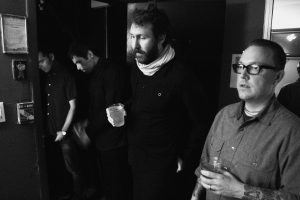
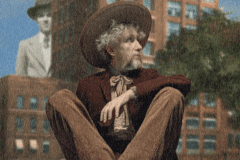
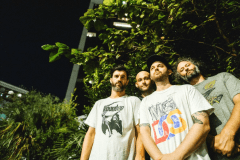
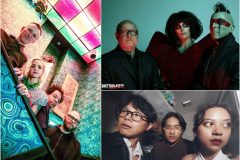
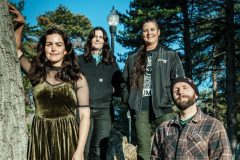

Social Media